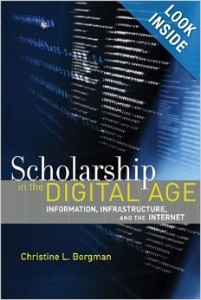
Seminal Work, Broad Overview, Provocative on All Fronts, June 18, 2008
Christine L. Borgman
FINAL REVIEW 22 June 2008
This is not a technical book, it focuses more on the socio-political aspects of how knowledge is communicated among scholars. While it addresses fraud, it does not address the ideological war against science, high crimes and misdemeanors including deliberate lies to the public, or the nuances of “fog facts” and “lost history.”
The author brings to this effort past experience in the Alexandria Digital Earth prototype project, and the National Research Council's signposts in cyberspace inquiry.
It would be good to have other reviews.
Overview comment: The author has done an extraordinary job in designing this book–writing it must have been easy once the seven page outline of detailed contents was created.
My notes:
+ National Science Foundation (NSF) did not begin investing in cyber-infrastructure until 2006 (my first web site was created in 1994).
+ Grab this lady for the project. She integrates informaiton science, information psychology, information sociology, information politics, and information culture in a manner so well presented I don't mind the headache.
+ Cites G. C. Bowker on data diversity, and ends the book with the observation that search and retrieval across specialized data sources is till very difficult (See Stephen E. Arnold's chapter <Search panacea or ploy:
Can collective intelligence improve findability?>, URL in the comment.
+ Words and concepts covered by the author, with substantive citation, that I found particularly interesting:
– Data withholding
– Knowledge diffusion
– Consequences of misconduct
– Cultural memory
– Open standards
– Accidents
– History and sense-making
– Cultural boundaries of science (see Dick Klavans and Brad Ashfords' lovely Maps of Science web site)
– Knowledge lost
– Bibliometrics, data as capital
– Ecologies of knowledge
– Ethnography of infrastructure within communities
– Communities of learning, meaning, identity
– Internet Time and unreliability of search engines
– Geographies of the Internet (the project is mapping substnative knowledge)
– The end of isolated inquiry and isolated conclusions (far future)
– “outcomes” and “results” are not in this book–it is a survey
– book's major self-limitation is its exclusive focus on academia–the other seven tribes of intelligence (government, military, law enforcement, commerce, media, non-profits, and civil societies including religions and labor unions are not addresses at all)
– talk about data intensive science but unwitting of urgency of getting to real-time science (changes that used to take 10,000 years now take 3)
– no discussion of retrospective research
– dismissive of self-publishing
– pre-print lag times to publishing are worse than the government
– peer review is broken (as well as tedious)
– conferences not yet digital
– dissemination, diffusion, publicity, transparency, discourse
– search and dfiscovery very corrupt (see Arnold–less than 2% efficacy)
– publishers losing ground to online (greed is killing them as well)
– termporal patterns and pattern analysis of the aggregate knowledge
Heart of the book is the issue of open access combined with the immaturity of the content, tools, and architecture of the digital world of knowledge. Legal, cultural, and technical obstacles will not be settled soon.
I put this book down with two thoughts: it is a stellar piece of well-documented and well-conceived reflection–and it barely scratches the surface of what can and should be known about scholarship in the digital age, to include call centers in China and India able to teach their respective 1.5 billion poor populations one cell call at a time. Schools and universities are still in the industrial era, half advanced day care and half prison. Knowledge is no longer an academic domain–it is the world brain emergent, with eight tribes of knowledge ignoring one another in 183 languages we don't speak, with the cell phone, not the laptop, as the great equalizer and enabler of the wealth of networks.
See also:
The Future of Ideas: The Fate of the Commons in a Connected World
The Age of Missing Information
Fog Facts: Searching for Truth in the Land of Spin
Lost History: Contras, Cocaine, the Press & ‘Project Truth'
Forbidden Knowledge: From Prometheus to Pornography
Voltaire's Bastards: The Dictatorship of Reason in the West
Manufacturing Consent: The Political Economy of the Mass Media
Weapons of Mass Deception: The Uses of Propaganda in Bush's War on Iraq
Leadership and the New Science: Discovering Order in a Chaotic World
Collective Intelligence: Creating a Prosperous World at Peace



